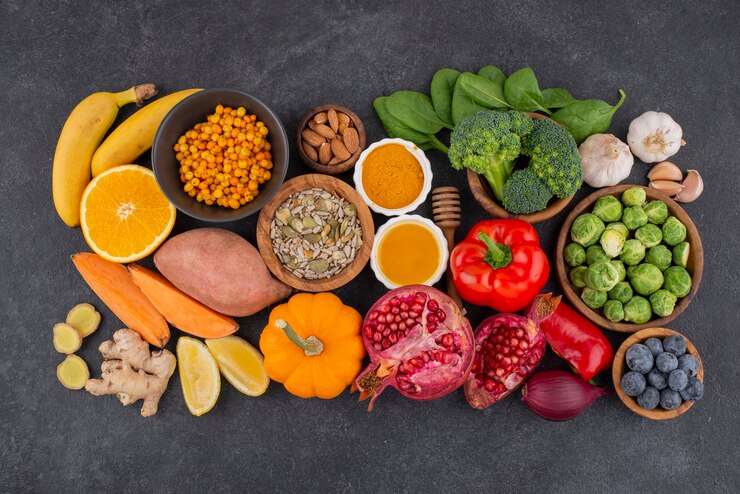No products in the cart.

Know Your Antioxidants
Antioxidants are like superheroes for our bodies. These are molecules that help protect cells from damage caused by free radicals. Free radicals are unstable molecules that can harm cells, protein and DNA, contributing to aging and various diseases such as cancer, cardiovascular diseases and neurodegenerative disorders.Antioxidants work by neutralizing free radicals, thus preventing them from causing harm. They are naturally present in many foods, fruits, vegetables, nuts, whole grains and some beverages like green tea.
Here are top 10 antioxidants that can be included regularly in the diet
Types & sources of Antioxidants
1. Vitamin C or ascorbic acid
Vitamin C or ascorbic acid is a water soluble vitamin that is essential for human health. Humans cannot produce vitamin C endogenously, so it must be obtained through diet. Vitamin C health benefits include its role in antioxidant activity, collagen synthesis and immune health.
Dietary Sources
Vitamin C is abundant in many fruits and vegetables. Some of the best sources are:
Citrus fruits- oranges, lemons, limes, grapefruits
Berries- strawberries, raspberries, blueberries
Tropical fruits- mango, pineapple, kiwi, papaya
Vegetables- bell peppers, broccoli, spinach, kale
2. Vitamin E (Tocopherol)
Vitamin E is a fat soluble nutrient that acts as an antioxidant, helping to protect cells from damage caused by free radicals. It’s important for immune function, skin health and cell signaling.
Dietary Sources
Nuts and seeds: Almonds, cashews, hazelnuts, peanuts, sunflower seeds and pumpkin seeds.
Vegetable oils: Sunflower oil, wheat germ oil and olive oil.
3. Beta-Carotene
Beta carotene is a well known carotenoid and precursor of Vitamin A. It is a red-orange pigment present in colorful fruits and vegetables. Adequate intake of beta-carotene rich foods can support vision, skin health, immune function and protection against oxidative stress. Consuming beta carotene with healthy fats such as nuts, olive oil helps improve absorption and also cooking methods like steaming, boiling and sauteing beta carotene rich foods improves bioavailability.
Dietary Sources
Vegetables- Carrots, sweet potatoes, pumpkins, spinach, broccoli
Fruits- Papaya, mangoes, muskmelon, apricots
4. Lycopene
Lycopene is a red carotenoid pigment found in many fruits and vegetables. Lycopene is responsible for the red color in tomatoes. Cooking and combining with healthy fats can improve the absorption of lycopene from food. Incorporating lycopene rich foods into diet can help prevent cancer, improve cardiovascular, eye and skin health.
Dietary Sources
Vegetables- Tomatoes, red bell peppers & red cabbage.
Fruits- Watermelon, pink grapefruit and guava.
5. Curcumin
Curcumin is the active compound found in turmeric. It has powerful anti-inflammatory and antioxidant properties and helps improve joint health, cognitive health, digestive and cardiovascular health. Curcumin absorbs and is effective when combined with black pepper and healthy fats.
Dietary Sources
The most common source of curcumin is turmeric roots
6. Anthocyanin
Anthocyanin are part of the flavonoid family and have strong antioxidant properties, which help protect cells from oxidative stress. It have health benefits like reducing inflammation, improving heart health, and reducing risk of certain chronic diseases.
Dietary Sources
Fruits – Berries, grapes, plums
Vegetables- Red and purple cabbage, brinjal, purple sweet potato and red onions.
7. Resveratrol
Resveratrol is a polyphenol compound, mostly found in the skin of red grapes. It has various health benefits like supporting heart health, protecting against cancer, improving brain function and regulating blood sugar.
Dietary Sources
Red grapes, blueberries, raspberries, mulberries and peanuts. It is also found in red wine.
8. Catechin
Catechins are flavonoids present in various foods and beverages, particularly tea. Green tea contains the most prevalent catechin, Epigallocatechin Gallate (EGCG). Catechin improves cardiovascular health, supports weight management, regulates blood sugar levels and offers neuroprotective effects.
Dietary Sources
Green tea, black tea, dark chocolate, apples, pears and red wine.
9. Lutein
Lutein is a powerful antioxidant that plays a role in protecting cells from oxidative damage, supporting eye health, reducing inflammation and contributing to overall well being.
Dietary Sources
Spinach, kale, broccoli, corn, egg yolk, green peas & zucchini.
10. Selenium
Selenium is a trace mineral and it forms part of the enzyme glutathione peroxidase, which helps protect cells from oxidative damage by neutralizing harmful free radicals. It helps protect cells from oxidative damage, support immune function and reduce risk of chronic disease.
Dietary Sources
Seafood- Tuna, sardines and shrimp.
Meat- Beef, chicken and pork.
Whole Grains- Brown rice and whole wheat.
Eggs
Dairy Products- Milk and curd
Incorporating antioxidants into daily routine through a balanced diet and healthy lifestyle choices can significantly contribute to overall health, enhance disease prevention and improve quality of life.

Dietitian



